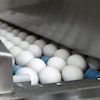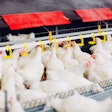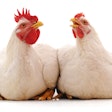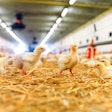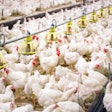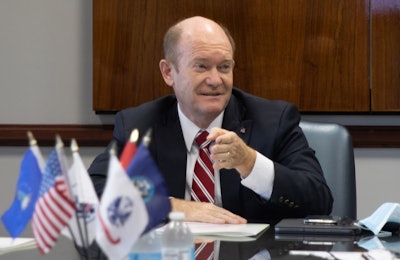
When asked what the most common concern of Delaware poultry producers was, Sen. Chris Coons said it was making sure “they continue to have strong market access.”
Perhaps nothing has done more to disrupt that access during the past two years than highly pathogenic avian influenza (HPAI), and Coons, D-Delaware, spent much of his time during a recent Bloomberg Odd Lots podcast discussing ways the federal government is helping producers deal with HPAI.
The podcast was hosted by Joe Weisenthal and Tracy Alloway.
HPAI Act
When HPAI strikes a poultry operation, the affected farm isn’t necessarily the only producer who is affected. Neighbors of an affected premises also are.
Coons, the co-founder and co-chairman of the Senate Chicken Caucus, explained how zones are established in areas around a farm that has had an infection, and HPAI-free farms within that zone are also hit financially – perhaps more so than the affected operation, because those neighbors don’t receive indemnity payments from the United States Department of Agriculture (USDA).
“What happens, frankly, is that the farmer whose flock is infected promptly gets a control order has to depopulate, has to destroy his entire flock, and is then compensated by the USDA for them. However, under current policy, all the other poultry farms in a six-mile radius or at 10-kilometer radius around that HPAI case are not allowed to bring new flocks in until the virus is deemed fully contained,” Coons said. “So, let’s say you’re a poultry farmer and I live 2-3 miles away and I’m a poultry farmer and you tragically have an HPAI infection. You destroy your whole flock. You get compensated for that. But now, I can’t have any more turns in my chicken house. I can’t bring in any more new flocks and be compensated. That’s the current situation.”
But if the Healthy Poultry Assistance and Indemnification Act (HPAI Act), introduced by Coons and Senate Chicken Caucus Co-Chair Roger Wicker, R-Mississippi, gets approved in the next farm bill, that will change.
“It essentially says if you undergo the same financial struggles because of HPAI, you’ll get the same compensation if you’re within that six-mile radius and your economic activity is harmed, than you would have if you actually had an infection in your flock,” Coons said.
The HPAI Act would also simplify the way that indemnity payments are calculated, “so that growers have greater security.”
When asked if USDA currently has any caps on the amount of funding available for indemnity payments, Coons said there should not be, adding, “within the scope of the USDA budget, I would expect this to be a relatively small line item.”
Vaccination
Presently, there is no legal way to vaccinate poultry against HPAI in the United States. Coons told the podcast hosts the USDA is currently considering a vaccination program and is running HPAI vaccine trials, but there are no approved vaccines.
He expressed trade concerns related to HPAI vaccination.
“We have to be careful about this, and make sure that there is a global decision about whether or not to move forward with vaccination as the means of addressing HPAI because it is truly a global market,” Coons said.
“The EU, for example, is slated to start vaccinations for poultry soon, whereas the U.K. prohibits vaccinations of poultry. I think it’s critical that efforts to vaccinate American flocks don’t have the unintended adverse impact of shutting off key export markets for us around the world.”
There are also concerns that any vaccine candidates are not approved with too much haste, in case they are not effective.
“If it’s not sufficiently efficacious, if it doesn’t have the impact of stopping the infection, it can simply lead to spreading it more broadly and not being noticed because the carriers are asymptomatic. Then, long-term public health consequences can be significant,” Coons said.
“I think it’s important that the current vaccine trials that USDA (are) undergoing be allowed to be thorough and complete. It would be a big change in our policy to deal with HPAI through vaccination, and if that comes to pass, we want to make sure that it’s medically sound – that it’s sound as a matter of public health and that it is sound as a matter of its potential impact on our poultry industry.
Other trade concerns
Even without vaccination in place, U.S. poultry producers are at times subjected to unnecessary trade restrictions because not all trade partners honor regionalization agreements.
“There are countries that I think are inappropriately using HPAI as an excuse to stop importing American chicken,” he said.
To some, they think that if there is an outbreak in the state of Washington, for example, then they would be justified in barring chicken exports from the Delmarva Peninsula.
“We’ve tried to get regionalization understood and accepted,” Coons said.
Why the Senate Chicken Caucus is needed
Coons is optimistic that the HPAI Act stands a good chance of being adopted into law, and that is largely that there is a bipartisan interest, and the Senate Chicken Caucus, with members from both political parties, is an example of that.
“The Chicken Caucus recognizes that chicken is a really important agricultural product all over the United States. It’s critical for my home state of Delaware, but (also) across the country. There’s 300,000 people who work in the poultry industry. It generates about $45 billion a year, and there’s major operations in about 30 states,” Coons said.
However, prior to when Coons was elected to the Senate in 2010, there was no such thing as the Senate Chicken Caucus. So, he and the late Sen. Johnny Isakson, R-Georgia, launched it in 2013.
Part of this is just good old home state interests for me. Delaware has 200 times more chickens than people,” Coons said. “I view (chicken) in many ways, as the most important animal protein in our country, and the Chicken Caucus focuses on the opportunities and challenges … of the American chicken industry.”
Most senators from poultry producing states have similar opinions, he said.
“At the end of the day, each of us as senators comes here to advance the interest and concerns of our constituents. … I have enjoyed and benefitted from finding core concerns of my constituents, like the vibrancy of our poultry industry, that really aren’t ideological, that really don’t have a Republican or Democratic attention to them,” Coons said.
Current state of avian influenza
There has not been a confirmed case of HPAI in a commercial poultry flock in the United States since April 19, according to the USDA Animal and Plant Health Inspection Service (APHIS), and the World Organisation for Animal Health (WOAH) has declared most states to be HPAI-free.
Coons acknowledged that the U.S. poultry sector isn’t “out of the woods” yet, but he praised the USDA and the animal health community for making so much progress in the fight against HPAI.
“I do want to say just how grateful I am and many of us are for APHIS and the (U.S.) Department of Agriculture for what they do to help make sure that poultry growers aren’t driven out of business by these outbreaks, that they’re identified, that they’re managed properly, they’re contained and then we’re able to go back to enjoying America’s most affordable, most ecologically sustainable, highest quality food protein, which is chicken,” he said.


